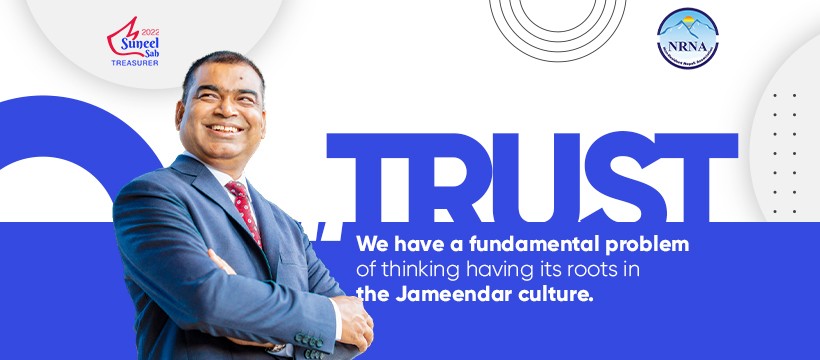We have a fundamental problem of thinking having its roots in the Jameendar culture. We have been treating NCCs as some anti-state actors, always trying to overthrow the state, the NRNA. When we talk about NRNA, we often put less emphasis on the role of NCCs. NCCs are the foundational pillars of our organization and critical for its survival. As the largest consortium of global Nepalis, it has a more significant role in uplifting the Nepalis community residing worldwide. We need to place policies that strengthen it and solidify the future course. One thing for sure needs to be corrected- -that is Jameendar mentality. We still haven’t come out from nurturing the old and defunct Jameendar mentality in our leadership and its execution.
Whether in the context of governance of Nepal or NRNA, we are still engaged in curtailing the rights of the state and NCCs. The same attitude and cultural thinking can be overtly seen in NRNA and its policies. We need to leave the NCCs free as a bird. We should let it fly on its whim and desire, we can’t bind them in undemocratic, emotionally charged, and I would not mind saying Jameendari rules when it comes to its governing.
The proposed MOU to the NCCs has some fundamental errors, which I have been trying hard to fight with. In the context of NCC USA, we all know that it is registered under the law of the USA. We can’t force it to sign any document that contradicts its rules and regulations. I can’t imagine how we can even think of such terms and conditions where it categorically dictates the prevailing of Nepalese law over any conflicts and disputes. Is that even allowed and ever thought of when we registered in the state of Tennessee? My point is, as long as, we are registered here in the USA, we can’t accept that.
Let’s not forget that NCC USA is registered here in the USA with its mission and vision to advance the welfare and issues of Nepalese in the USA, first to the US government and its federal institutions. Relationship with the NRNA is pretty much dependent on the confluence of interests and agenda that could change in due course of time. Nepalese Americans are the first and the foremost when it comes to the importance of NCC USA. We are not a political or social organization advancing any particular agenda of the government of Nepal. Our love and respect for Nepal is deeply embedded in our heart and mind, unfortunately not in the constitution and bylaws of the NCC USA. This is the fact.




